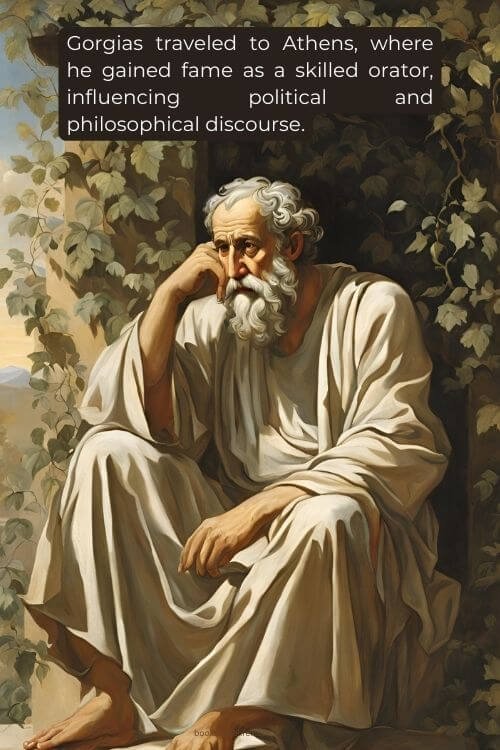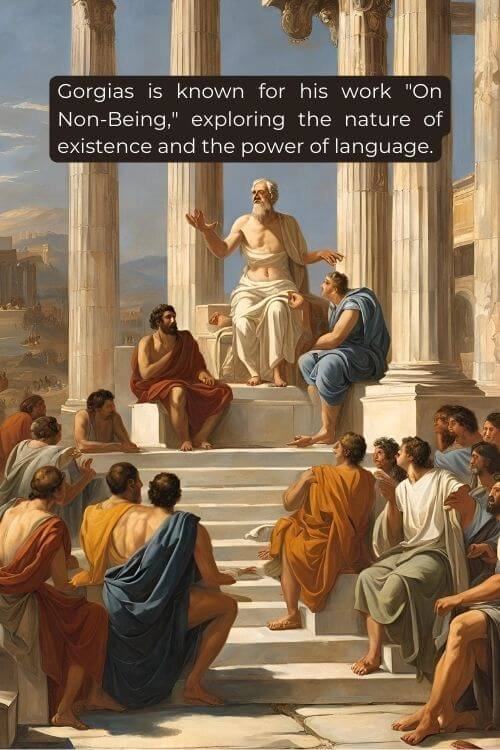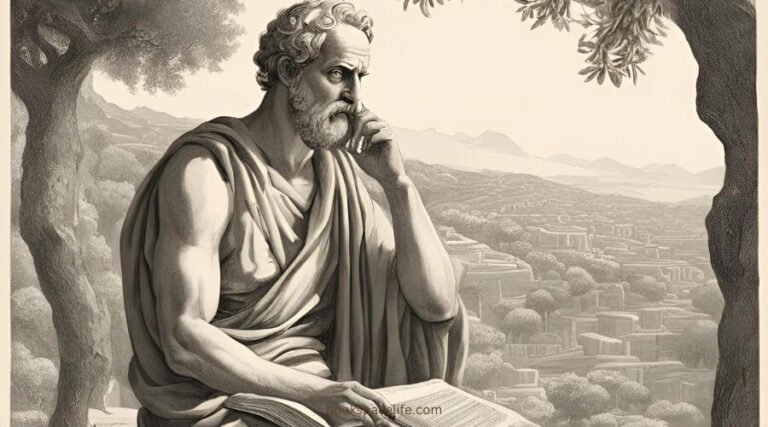Thales of Miletus
Gorgias: The Master Of Rhetoric and the Art of Persuasion
Gorgias of Leontini (485 – 380 BCE) is a towering figure in the history of ancient Greek philosophy, celebrated for his profound contributions to the art of rhetoric and his unique philosophical perspectives.
A member of the Sophistic movement, Gorgias is known for his skillful oratory and his exploration of the nature of reality and language.
His ideas on persuasion and the power of words have left an indelible mark on both philosophy and communication.
This blog post will delve into Gorgias’s life, travels, early education, philosophical contributions, and the lasting impact of his work on the fields of rhetoric, philosophy, and beyond.
Quick Read
Table of Contents
(1) Early Life and Education
Gorgias was born in Leontini, a Greek colony in Sicily, around 485 BCE. The exact details of his early life and education remain elusive, but it is believed that he came from a noble family, which likely afforded him access to a good education.
He was exposed to various philosophical ideas, which laid the foundation for his later work.
While Gorgias’s specific teachers are not well-documented, he was part of a cultural milieu that valued rhetoric and public speaking, elements that would shape his philosophical outlook.
It is likely that he was influenced by the philosophical currents of his time, including the teachings of earlier philosophers like Heraclitus and Parmenides, as well as the burgeoning Sophistic tradition that emphasized the power of language and persuasion.

(2) Travels and Philosophical Development
Gorgias’s travels were instrumental in his philosophical development. He traveled extensively throughout Greece, including to major city-states like Athens, where he became a prominent figure in the intellectual and political life of the time.
His travels allowed him to engage with diverse philosophical ideas and audiences, enhancing his rhetorical skills and deepening his understanding of the art of persuasion.
In Athens, Gorgias gained fame as a teacher of rhetoric, attracting students eager to learn the art of oratory.
His performances and lectures captivated audiences, and his reputation as a skilled rhetorician grew.
This period of his life solidified his place within the Sophistic movement, which sought to explore the complexities of language, truth, and morality.
(3) Philosophical Contributions
- Rhetoric and Persuasion: Gorgias is often regarded as one of the founders of rhetoric, the art of persuasion through language. He believed that effective communication was essential for success in public life and that the ability to persuade an audience was a valuable skill. His teachings emphasized the importance of style, delivery, and the emotional appeal of language, elements that remain crucial in contemporary rhetoric.
Gorgias famously stated, “Rhetoric is the art of persuasion.” He taught that through mastery of language, one could shape opinions and influence decisions, highlighting the power of words to affect change.
His emphasis on rhetoric as a tool for persuasion paved the way for later thinkers, including Aristotle, who further developed the principles of rhetorical theory.
- The Nature of Reality: In addition to his contributions to rhetoric, Gorgias is known for his philosophical explorations regarding the nature of reality. In his work “On Nature”, Gorgias presented a radical skepticism that questioned the existence of objective reality. He famously argued that:
- Nothing exists.
- If anything exists, it is incomprehensible.
- If it is comprehensible, it cannot be communicated.
Through these assertions, Gorgias challenged conventional notions of truth and knowledge, suggesting that human perception is inherently flawed and that objective reality may be unattainable.
His skepticism encouraged later philosophers to engage with questions about existence, perception, and the limitations of human understanding.
- The Power of Language: Gorgias believed that language was not merely a tool for communication but a powerful instrument capable of shaping reality. He argued that the way language is used can create new meanings and realities for individuals and societies. This insight laid the groundwork for discussions on the philosophy of language, exploring the relationship between words, thoughts, and the world.
- Encomium of Helen: One of Gorgias’s most famous works, “Encomium of Helen,” is a persuasive speech defending Helen of Troy against accusations of causing the Trojan War. In this work, Gorgias employs rhetorical strategies to argue that Helen was not to blame for her actions, emphasizing the power of rhetoric to sway opinions and shape narratives. This piece exemplifies his mastery of persuasive techniques and highlights his belief in the malleability of truth through language.
- Ethics and Morality: Gorgias’s views on morality and ethics were influenced by his skepticism about objective truth. He believed that ethical judgments were subjective and dependent on individual perspectives. This relativistic approach to ethics raised questions about the nature of justice and morality, challenging the idea of universal moral principles.

(4) Influence and Impact
Gorgias’s ideas and teachings have had a lasting impact on various fields, including philosophy, rhetoric, and communication:
- Influence on Later Philosophers: Gorgias’s skepticism and exploration of reality influenced later philosophers, including the Sophists and Socratic thinkers. His radical questioning of truth paved the way for dialogues on epistemology and metaphysics, as later philosophers sought to address the challenges he presented.
The tensions between Gorgias’s ideas and those of Plato and Aristotle exemplify the rich intellectual exchanges of the time. Plato’s dialogues often critique the Sophists, including Gorgias, while simultaneously engaging with their ideas. This dialectical engagement contributed to the evolution of philosophical thought in ancient Greece.
- Foundations of Rhetorical Theory: Gorgias’s contributions to rhetoric established a foundation for the study of persuasive communication. His emphasis on the emotional appeal of language and the techniques of persuasion influenced subsequent rhetorical theorists, including Aristotle, who systematized rhetoric into a formal discipline.
The principles of rhetoric that Gorgias articulated continue to resonate in contemporary communication studies, politics, and public speaking. His insights into the power of language and persuasion remain relevant in an age where rhetoric shapes public discourse and opinion.
- Cultural Impact: Gorgias’s life and work reflect the vibrant intellectual culture of ancient Greece, characterized by a pursuit of knowledge and a willingness to challenge established beliefs. His contributions symbolize the transition from mythological explanations of the world to rational inquiries, setting the stage for the flourishing of philosophy in classical Greece.
- Legacy in Philosophy and Beyond: Gorgias’s legacy endures in various fields, including philosophy, rhetoric, and cultural studies. His radical skepticism and exploration of language have influenced contemporary discussions about truth, meaning, and the complexities of human communication.
Gorgias’s insights into the relationship between language and reality invite ongoing inquiry into the nature of discourse and its impact on social dynamics. His ideas about persuasion and the power of rhetoric continue to inspire scholars and practitioners in fields such as law, politics, and media studies.
- Modern Relevance: Gorgias’s work remains relevant today, particularly in discussions surrounding the influence of language in shaping public opinion and societal norms. The ability to persuade and influence through rhetoric is as critical in contemporary discourse as it was in ancient Greece. Gorgias’s teachings remind us of the importance of critical engagement with language and the power it holds in shaping our understanding of the world.
(5) Conclusion
Gorgias of Leontini emerges as a pivotal figure in the history of philosophy and rhetoric, whose innovative ideas and teachings have left a lasting imprint on Western thought.
Through his exploration of persuasion, reality, and language, Gorgias challenged conventional beliefs and encouraged critical engagement with the complexities of existence.
His legacy endures in the realms of philosophy, communication, and cultural studies, inspiring future generations to grapple with the profound questions that shape our understanding of truth and reality.
As we reflect on Gorgias’s life and teachings, we are reminded of the enduring power of language and the importance of rhetorical skill in navigating the complexities of human experience.
In an age where communication plays a central role in shaping public opinion and discourse, Gorgias’s insights continue to resonate, inviting us to explore the art of persuasion and the intricate relationship between words and reality.
His contributions serve as a testament to the power of philosophical inquiry and the importance of engaging critically with our beliefs, inspiring us to delve deeper into the mysteries of existence and the profound impact of language on our lives.n, explore, and seek knowledge in the face of life’s paradoxes.
(A) 7 Quick Facts on Gorgias
- Date of Birth – Gorgias was born around 485 BCE, during the early development of Greek rhetoric and philosophy.
- Place of Birth – He hailed from Leontini, a city in Sicily, which was influential in ancient Greek culture.
- Early Education – Gorgias likely studied rhetoric and philosophy, becoming a prominent Sophist and emphasizing persuasive speech.
- Travel to Athens – He traveled to Athens, where he gained fame as a skilled orator, influencing political and philosophical discourse.
- Rhetorical Contributions – Gorgias is known for his work “On Non-Being,” exploring the nature of existence and the power of language.
- Sophistic Philosophy – He argued that rhetoric could persuade people regardless of the truth, highlighting the relativity of knowledge and belief.
- Legacy – Gorgias is considered one of the founders of Sophism, impacting the development of rhetoric and philosophy in ancient Greece.
(B) 10 Quotes attributed to Gorgias
- Nothing exists; even if something exists, nothing can be known about it; even if something can be known, knowledge cannot be communicated. This encapsulates his extreme skepticism about existence and knowledge.
- I have no power over my own body. A reflection on the limitations of human agency.
- Rhetoric is the art of persuasion. Defining rhetoric as a powerful tool in influencing others.
- Words are powerful; they can create and destroy. Emphasizing the significant impact of language and communication.
- The greatest good is to make oneself a master of the language. Highlighting the importance of linguistic skill in achieving success.
- There is no greater evil than a bad reputation. Stressing the significance of one’s public image and perception.
- The power of speech is to persuade. Pointing to the persuasive nature of rhetoric as a vital skill.
- For the most part, people do not think about their own thinking. Reflecting on the lack of self-awareness in human cognition.
- What is just is simply what is pleasing. Suggesting that notions of justice are subjective and based on personal preference.
- The good is what is pleasing. Reinforcing the idea that goodness is tied to personal satisfaction and enjoyment.








